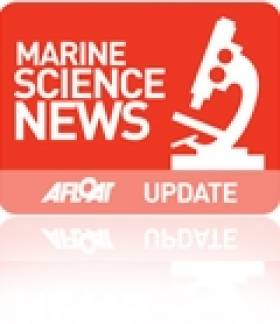Displaying items by tag: International SmartOcean Graduates Enterprise Initiative
Advanced Marine Technologies Course Onboard RV Celtic Voyager
#MarineSCIENCE- Postgraduate students from the International SmartOcean Graduate Enterprise Initiative (ISGEI) recently had the experience of a two-day practical offshore course in advanced marine technologies onboard the national research vessel RV Celtic Voyager.
The course focussed on Sensors, Moorings and other autonomous marine monitoring systems and examined biological, chemical, acoustic and visual sensing, biofouling of sensors, communications and telemetry and sensor calibration.
This innovative pilot training course was developed and delivered by Dublin City University and the Strategic Marine Alliance for Research and Training (SMART) based in Galway-Mayo institute of Technology, in association with NUI Galway and Smart Bay Ireland and with ship-time provided by the Marine Institute.
According to Prof. Fiona Regan of DCU "Practical offshore courses enhance the skills base of the International Smart Ocean Graduates. We need to build capacity in this area and the SMART programme offers fantastic training opportunities for our researchers."
The practical considerations when deploying a sensor platform was also explored, in particular site assessment, determination of local hydrographic conditions, deployment
and recovery of mornings and in situ maintenance.
Other elements essential to working in an offshore environment were examined including navigation, safety at sea, and the risk assessment of operations at sea.
James Kelly of Tyndall National Institute is an ISGEI student and took part in the training: "The most valuable part of the training for me would be related to the sensor work and the information on biofouling, and as I am an electrical engineer, that is what I had hoped to get from the training".
SMART Coordinator Dr Pauhla McGrane stressed the collaborative effort involved in the development and delivery of the course stating "The ISGEI Sensors and Moorings course shows what can be achieved through effective collaboration of research and industry with the pooling of expertise and infrastructure to deliver innovative, novel training essential to the career development of emerging marine scientists and technicians".
The training was carried out under the Sea Change strategy with the support of the Marine Institute and the Marine Research Sub-programme of the National Development Plan 2007–2013.
























































